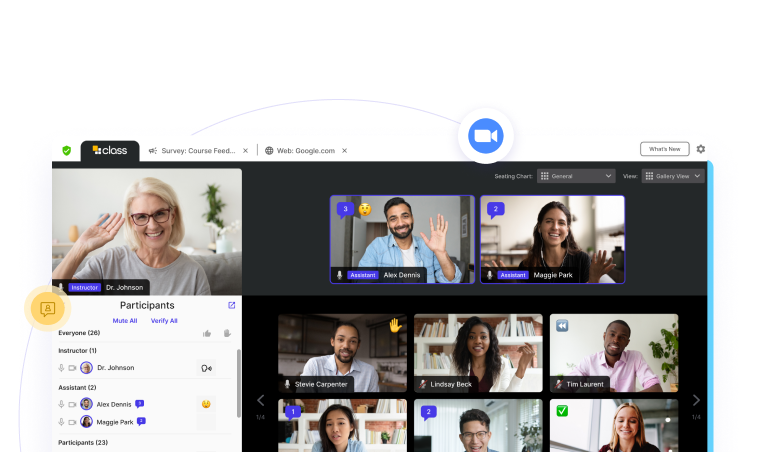
Class is the next generation virtual classroom for K-12, higher education, government agencies, and the workplace. Contact us today to schedule your live demo and see Class in action.

Class is the next generation virtual classroom for K-12, higher education, government agencies, and the workplace. Contact us today to schedule your live demo and see Class in action.

This article was originally written and published by Times Higher Education in partnership with Class.
Providing ongoing technological support to faculty is essential for institutions to offer personalised learning pathways and modernise pedagogical models to create future-ready graduates.
The multitude of new technologies available today not only presents opportunities to enhance hybrid models but also poses challenges in delivering engaging online classes. Identifying the right technology to create interactive online and hybrid courses is proving to be a challenge for many universities. Initiatives to provide effective faculty training and standardise infrastructure are essential to meet both faculty and student needs and expectations.
A Times Higher Education webinar, held in partnership with Class, brought together a panel of experts from the higher education sector in the Asia-Pacific region to discuss the strategies universities can implement to better support faculty, strengthen university-industry links and collect relevant data to modernise pedagogical and assessment models.
Even as universities embrace hybrid models, continuous faculty training is essential to improve online and hybrid teaching, the panel agreed. Nora Koslowski, Chief Learning Innovation Officer at Melbourne Business School, shared examples of the skills faculty members must develop to update their teaching models.
Skills such as curiosity, inclusivity and discernment will enable faculty to build their digital capabilities, explore technologies that meet the needs of diverse student cohorts and design courses that are fit for synchronous and asynchronous classes, Koslowski said.
Matthew Baker, Senior Vice President of Strategy and International at Class, advised universities to “bring the technology that teachers are familiar with so that there’s a pathway for them to be comfortable going across the barrier of that new technology”.
In October 2023, a survey published by Class Technologies and Times Higher Education explored the experiences and perceptions of hybrid teaching among university faculty in more than 15 countries. According to the report, 66 percent of faculty now prefer hybrid instruction, Baker noted.
Rijanto Purbojo, Director of the Center for Teaching and Learning at Pelita Harapan University, explained that the university introduced a new learning method called multi-flexible learning in 2020. The objective was to offer flexible learning and maintain the quality of education during the pandemic.
Matt Hao Chen, Manager of Educational Design, Innovation and Quality at Monash University, said that data collected by educational technology and learning analytics can help plan interventions, boost engagement and create personalisation in learning.
Greg Winslett, deputy director of digital learning at the University of Queensland, said that universities are at the initial stage of deciphering data and trends about engagement in online classes. But gathering this information and analysing the online behaviour of students can help faculty to examine a student’s overall academic progress, he added.
Going forward, strong university-industry collaboration can create more industry-based opportunities to prepare graduates for emerging hybrid workplaces. Co-designing online and hybrid courses with industry partners, alumni and students provides an opportunity to create excellent hybrid learning experiences, concluded Chen.

Class is the next generation virtual classroom for K-12, higher education, government agencies, and the workplace. Contact us today to schedule your live demo and see Class in action.

Class is the next generation virtual classroom for K-12, higher education, government agencies, and the workplace. Contact us today to schedule your live demo and see Class in action.
Get our insights, tips, and best practices delivered to your inbox

Sign up for a product demo today to learn how Class’s virtual classroom powers digital transformation at your organization.

Features
Products
Integrations